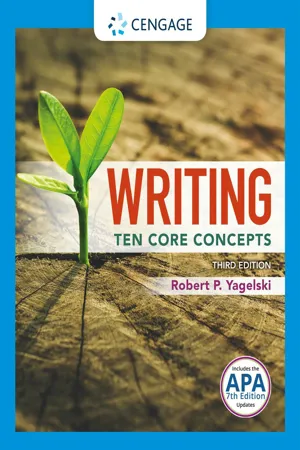
- English
- PDF
- Available on iOS & Android
Writing: Ten Core Concepts (w/ MLA9E Updates)
About this book
Master the fundamentals critical to becoming an effective writer with Yagelski's WRITING: TEN CORE CONCEPTS, 3E. Carefully designed guides, thoroughly integrated with the core concepts, set this book apart as you study key rhetorical moves within analytical, persuasive and narrative writing. Applied assignments challenge you to complete causal analysis, academic arguments and literacy narratives. This edition presents writing as an interaction between writer and reader, teaching you how to use writing skills to participate in important conversations shaping today's lives. This edition features 26 new readings and 11 new sample student essays as well as new chapters on literacy narratives, summary-response essays, annotated bibliographies and presentations. Updates guide you in working with digital resources, expand your critical reading strategies and highlight the latest APA and MLA guidelines. In addition, MindTap digital resources offer new interactive samples and activities.
Frequently asked questions
- Essential is ideal for learners and professionals who enjoy exploring a wide range of subjects. Access the Essential Library with 800,000+ trusted titles and best-sellers across business, personal growth, and the humanities. Includes unlimited reading time and Standard Read Aloud voice.
- Complete: Perfect for advanced learners and researchers needing full, unrestricted access. Unlock 1.4M+ books across hundreds of subjects, including academic and specialized titles. The Complete Plan also includes advanced features like Premium Read Aloud and Research Assistant.
Please note we cannot support devices running on iOS 13 and Android 7 or earlier. Learn more about using the app.
Information
Table of contents
- Cover
- Brief Contents
- Contents
- Preface
- Acknowledgments
- Chapter 1: Why We Write
- Chapter 2: Ten Core Concepts for Effective Writing
- Chapter 3: The Ten Core Concepts in Action
- Chapter 4: A Student Writer Applies the Core Concepts
- Chapter 5: Understanding Analytical Writing
- Chapter 6: Examining Causes and Effects
- Chapter 7: Comparing and Synthesizing
- Chapter 8: Conducting Rhetorical Analysis
- Chapter 9: Analyzing Literary Texts
- Chapter 10: Evaluating and Reviewing
- Chapter 11: Understanding Argument
- Chapter 12: Making Academic Arguments
- Chapter 13: Making Arguments in Public Discourse
- Chapter 14: Presenting a Proposal
- Chapter 15: Understanding Narrative Writing
- Chapter 16: Writing Personal Narratives
- Chapter 17: Writing Literacy Narratives
- Chapter 18: Writing Informative Essays
- Chapter 19: Reading for Understanding and Engagement
- Chapter 20: Writing Summary-Response Essays
- Chapter 21: Finding Source Material
- Chapter 22: Evaluating Sources
- Chapter 23: Using Source Material
- Chapter 24: Preparing an Annotated Bibliography
- Chapter 25: Citing Sources Using MLA Style
- Chapter 26: Citing Sources Using APA Style
- Chapter 27: Designing Documents
- Chapter 28: Creating Presentations
- Chapter 29: Composing with Style
- Chapter 30: Avoiding Common Problems in Grammar and Usage
- Index